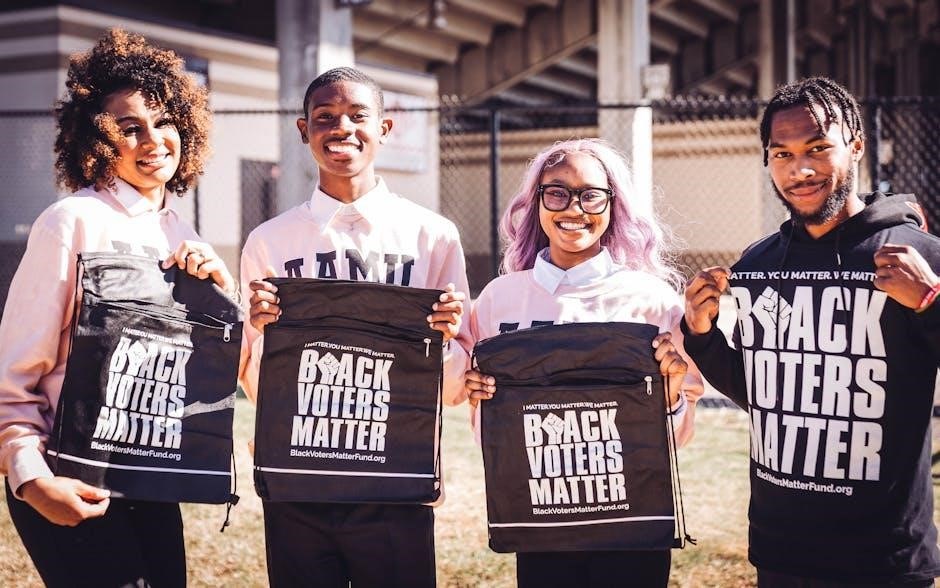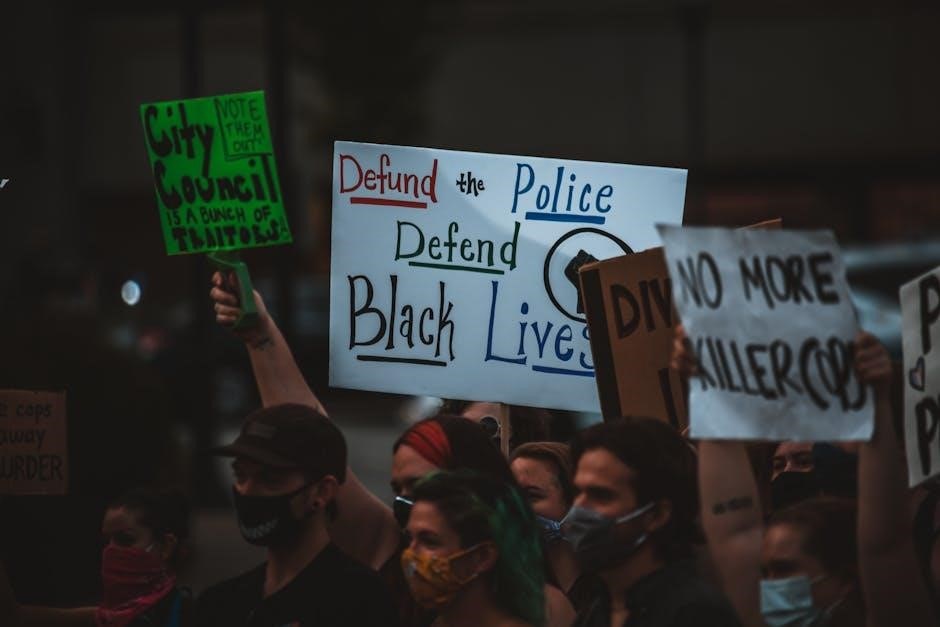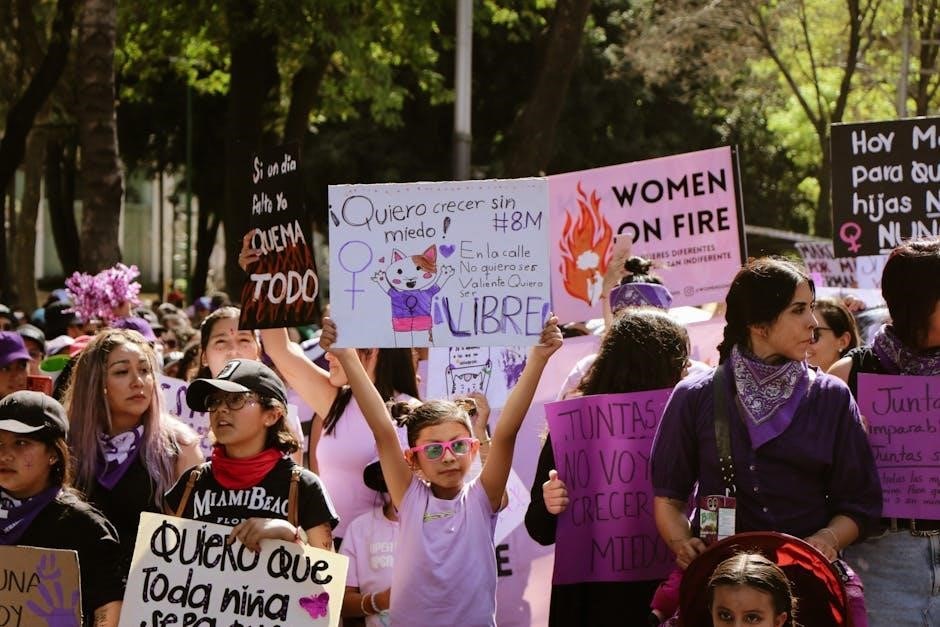Essential readings, such as works by D.A. Matcha and Krotkova N.V., explore diversity, equity, and inclusion, providing foundational knowledge for social justice education and its practical applications.
The Importance of Diversity and Social Justice in Education
Diversity and social justice are crucial in education as they foster inclusive environments, ensuring all students feel valued and supported. By addressing systemic inequities, educators can create equitable opportunities for learning and growth. Readings and resources, such as those highlighted in the EDISJ Challenge, provide practical tools to integrate social justice into curricula. These efforts not only enhance student engagement but also prepare learners to navigate a diverse world. Promoting diversity and social justice in education helps break down barriers, empowering students to advocate for fairness and equality in their communities and beyond.
Key Principles of Social Justice: Equity, Inclusion, and Supportive Environments
The core principles of social justice—equity, inclusion, and supportive environments—guide efforts to create fair and compassionate systems. Equity ensures resources are distributed based on need, while inclusion values diverse perspectives and identities. Supportive environments foster belonging and safety for all individuals. Readings, such as those by Krotkova N.V., emphasize these principles, highlighting their importance in education and society. By implementing these principles, educators can address disparities, promote unity, and empower individuals to thrive in diverse settings, ultimately contributing to a more just and equitable world.
Educational Resources for Diversity and Social Justice
Essential readings, such as works by D.A. Matcha and Krotkova N.V., provide foundational knowledge on diversity and social justice, offering practical tools for promoting equity and inclusion in education.
Essential Readings for Understanding Diversity and Social Justice
Essential readings, such as works by D.A. Matcha and Krotkova N.V., provide foundational knowledge on diversity and social justice, offering insights into equity, inclusion, and supportive environments. These readings explore the allocation of resources based on needs, valuing all individuals equally, and promoting gender diversity in educational settings. They also discuss global perspectives, such as diversity issues in Australian schools, and offer practical tools for educators. These texts are crucial for understanding the principles of social justice and their application in education, helping to create inclusive environments and address challenges in promoting diversity and equity in various educational contexts.
The Role of Readings in Promoting Social Justice Education
Readings play a vital role in fostering social justice education by providing foundational knowledge and practical strategies for promoting diversity and inclusion. They challenge biases, encourage empathy, and equip educators and students with tools to address inequities. Through diverse perspectives, readings help bridge theory and practice, enabling individuals to understand systemic issues and advocate for change. These materials also support professional development, offering insights into creating supportive environments and engaging in interactive activities that promote social justice. By exploring global and local issues, readings empower learners to contribute meaningfully to inclusive and equitable communities, both within and beyond educational settings.
Social Justice Education and Professional Development
Readings like “Readings in Medical Sociology” and “The EDISJ Challenge” provide essential tools for professional development, helping educators and students understand diversity, inclusion, and social justice principles.
Professional Development Opportunities for Faculty and Staff
Professional development in social justice education is vital for fostering inclusive environments. Resources like “Readings in Medical Sociology” and the EDISJ Challenge offer comprehensive tools for faculty and staff. These materials provide insights into equity, diversity, and inclusion, equipping educators with practical strategies. The EDISJ Challenge, developed by the PLA Committee on Equity, Diversity, Inclusion, and Social Justice, includes interactive activities and case studies. Such initiatives enable professionals to address systemic inequalities and promote social justice in educational settings. By engaging with these resources, faculty and staff can enhance their understanding and implementation of inclusive practices, benefiting both students and institutions.
Engaging Students in Social Justice Through Interactive Activities
Interactive activities play a crucial role in engaging students with social justice issues. Resources like the EDISJ Challenge and drawing-based instruments such as the Draw-A-Scientist-Test (DAST) encourage participation and reflection. These tools help students explore diverse perspectives and challenge stereotypes. For instance, DAST derivatives assess how children perceive scientists, promoting discussions on gender and diversity in STEM. Additionally, readings and activities from “Reading and Writing the World with Mathematics” offer pedagogical approaches to integrate social justice into curriculum. By fostering active learning, these interactive methods empower students to critically analyze societal issues and advocate for equity and inclusion in their communities.

Diversity and Inclusion in Schools
Diversity and inclusion in schools involve supporting minority gender groups and creating environments where all students feel valued. Strategies include tailored resources and equitable practices to foster belonging.

Supporting Minority Gender Groups in Educational Settings
Supporting minority gender groups in schools requires inclusive policies and practices. Resources like “Readings in Medical Sociology” and works by N;V. Krotkova emphasize equity and tailored support. Educators must create safe spaces, promote gender-neutral facilities, and integrate diverse perspectives into curricula. Professional development programs, such as Social Justice Education initiatives, equip staff with tools to address gender-based challenges. By fostering inclusive environments, schools can ensure all students, regardless of gender identity, feel valued and supported. This approach aligns with social justice principles, promoting equality and opportunities for marginalized groups to thrive academically and socially.
Challenges and Strategies for Creating Inclusive School Environments

Creating inclusive school environments faces challenges like implicit bias, lack of diverse resources, and resistance to change. Strategies include professional development for educators, integrating diverse texts, and fostering dialogue. Schools can adopt inclusive policies, such as gender-neutral restrooms and anti-discrimination measures. Engaging with the community and involving students in decision-making also promotes inclusivity. Resources like “Readings in Medical Sociology” and works by Krotkova N.V. provide insights into equity and support. By addressing these challenges, schools can build environments where all students feel valued, supported, and empowered to succeed, aligning with social justice principles and fostering a culture of belonging.
Higher Education and Social Justice Initiatives
University programs, like the EDISJ Challenge, utilize readings by experts such as D.A. Matcha and Krotkova N.V. to promote diversity and social justice initiatives in higher education.
University Programs Focused on Diversity and Social Justice
University programs worldwide incorporate readings from experts like D.A. Matcha and Krotkova N.V. to foster diversity and social justice. These readings provide foundational knowledge on equity, inclusion, and supportive environments, essential for creating inclusive educational settings. They address gender diversity issues in schools and offer strategies for promoting social justice. Additionally, interactive tools like the EDISJ Challenge complement these readings, engaging students and faculty in practical activities that enhance awareness and advocacy. Such programs ensure that higher education institutions lead in fostering a culture of diversity and social justice, preparing future professionals to address global challenges effectively.
Case Studies: Successful Social Justice Initiatives in Higher Education

Case studies highlight successful social justice initiatives in universities, such as the EDISJ Challenge, which offers interactive activities to promote diversity and inclusion. These initiatives often draw on readings from experts like D.A. Matcha and Krotkova N.V., providing theoretical frameworks for practical applications. For instance, programs addressing gender diversity in Australian schools demonstrate how educational resources can drive meaningful change. By integrating such readings, universities create supportive environments that foster equity and social justice, ensuring students and faculty are equipped to address global challenges effectively. These case studies serve as models for institutions aiming to enhance their commitment to social justice education.

Interactive Tools for Social Justice Education
Interactive tools, such as the EDISJ Challenge, provide engaging online resources and activities for diversity and inclusion, enhancing social justice education through practical applications.
The EDISJ Challenge: An Interactive Approach to Social Justice Learning
The EDISJ Challenge offers an innovative platform for engaging with social justice issues through interactive activities and resources. Designed to foster deeper understanding and practical application, the challenge encourages participants to explore diverse perspectives and develop inclusive practices. By integrating readings and real-world scenarios, it provides a comprehensive learning experience. This approach not only enhances awareness but also equips individuals with the tools to advocate for equity and inclusion in their communities. The EDISJ Challenge is a valuable resource for educators and learners committed to advancing social justice education.
Online Resources and Activities for Diversity and Inclusion
Online platforms provide a wealth of resources and interactive activities to promote diversity and inclusion. Websites like the EDISJ Challenge offer specific tools and exercises to engage users in social justice learning. Additional resources include PDF readings, such as those by Krotkova N.V., which delve into gender diversity and social justice in educational settings. These materials are designed to allocate resources based on needs and value all individuals equally. By utilizing these online tools, educators and learners can foster supportive environments and address equity challenges effectively, ensuring a comprehensive approach to diversity and inclusion in various educational contexts.

Global Perspectives on Diversity and Social Justice
Global perspectives highlight diversity issues in various regions, such as Australian schools addressing gender diversity. International approaches and resources like the EDISJ Challenge promote inclusive learning environments worldwide.
Diversity and Social Justice Issues in Australian Schools
Australian schools face unique challenges in promoting diversity and social justice, particularly in supporting minority gender groups. Resources like the PLA Committee’s EDISJ Challenge and case studies highlight strategies to create inclusive environments. Educators are encouraged to address gender diversity through inclusive policies and targeted support. Interactive activities and professional development opportunities help foster equity and understanding. These initiatives aim to ensure all students, regardless of gender identity, feel valued and supported in their educational journey.
International Approaches to Promoting Social Justice in Education
Global perspectives on diversity and social justice highlight varied approaches to fostering equity in education. Nations adopt inclusive policies, cultural awareness programs, and community engagement strategies to address disparities. International organizations and collaborative efforts promote cross-cultural understanding and share best practices. For instance, case studies from Australia and other regions emphasize supporting minority gender groups and marginalized communities. Recommended readings, such as “Reading and Writing the World with Mathematics,” offer insights into pedagogies for social justice. These global initiatives inspire educators to adapt strategies that align with local contexts, ensuring education systems worldwide prioritize equity, inclusion, and social justice for all students.
Essential readings on diversity and social justice highlight their transformative impact on education, paving the way for future initiatives that prioritize equity, inclusion, and global collaboration.
Summarizing Key Concepts in Diversity and Social Justice
Diversity and social justice emphasize equity, inclusion, and supportive environments, ensuring resources are allocated based on needs and valuing all individuals equally. Readings highlight the importance of addressing systemic inequalities, promoting gender diversity, and supporting minority groups in educational settings. Professional development opportunities, such as Social Justice Education, empower educators to foster inclusive environments. Key concepts include the allocation of resources, equitable access to education, and the creation of safe spaces for diverse populations. These principles aim to dismantle barriers and promote social justice, ensuring all individuals can thrive. They form the foundation for creating inclusive and equitable educational systems globally.
Future Trends and Opportunities in Social Justice Education

Future trends in social justice education include the integration of technology, such as interactive tools like the EDISJ Challenge, to engage learners globally. University programs focused on diversity and inclusion are expanding, offering innovative approaches to address systemic inequalities. International collaboration and case studies from successful initiatives highlight the importance of global perspectives. Readings and resources, such as those by D.A. Matcha and Krotkova N.V., provide foundational knowledge, while new pedagogies emphasize actionable strategies for equity. These trends underscore the potential for education to drive meaningful change, fostering inclusive environments and empowering future generations to advocate for social justice worldwide.

